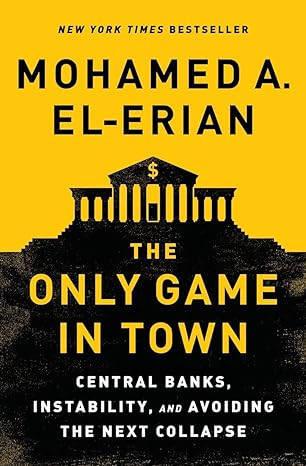
Mohammad El-Erian is not your typical American of Egyptian background. He has led PIMCO, one of the largest private equity firms in the world, and subsequent to that, led the endowment of Harvard University; none of which are the easiest of feats. But, there is also something very peculiar about Mohammad El-Erian’s financial acumen.
Throughout his decades in the private sector, he has interacted with no less than twenty Top 20 bankers. They range from Stanley Fisher, Janet Yellen, Ben Bernake, David Carney and more. Increasingly, he understands that all these central bankers, empirical and insightful as they are, often function within the context of their countries’ respective politics. More importantly, all the policy instruments of the central banks have reached their limitations.
While they can tweak the interest rate, and control the voluminous release of money into the international financial system, a role dominated not least by the Federal Reserve of the United States and the European Union bank, both if not all of them have hit the proverbial wall. None can continue to stimulate the global economy out of a stagnant income rut (where wages can no longer grow) nor put a tap on creeping inflation (where the prices of common items continue to go north). These two structural drags on the economy alone require more, rather than less, coordination between the central bankers.
While central bankers do meet, and often converge and agree on what is good for the rest of the global economy, they cannot necessarily make politicians understand that there is a need to reform the global economy from the ground up.
For example, there is really a need to reduce defense spending. Education and research should be strengthened. Indeed, the entire world should be geared for the A.I. revolution or the revolution of Artificial Intelligence. It is not globalization alone that is causing major economic disruption but automation, too.
Of course, Thomas Friedman, writing in “Thanks for Being Late,” can claim that Mohammad El-Erian is being an alarmist. That for every economic disruption, three jobs are also created in a process of “creative destruction,” as once foresaw by Joseph Schumpeter who argued that “being small is good.” But Mohammad El-Erian is a contrarian.
He believes that the new normal, where interest rates are almost down to zero or negative rates in some countries, is abnormal; as is happening in Japan and certain parts of Europe. Consumers and the private sector are paying banks to save their money, not the reverse.
Under such a setting, signals are clear that central banks have hit a major obstacle. If the global economy cannot be redeemed by central banks that control the spigot of the financial flow, then who can? Of course, politicians and leaders have to step up to the plate. But with these statesmen being so rare in the making, the world is essentially trapped. The rich will continue to milk the system, while the poor will lament, often resorting to violent actions, with increasing vim and vigor.
